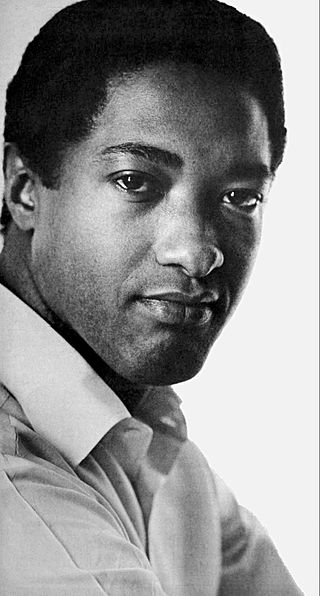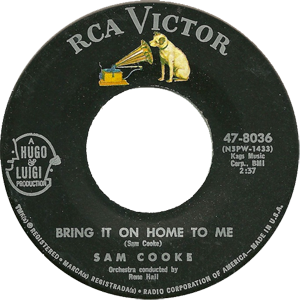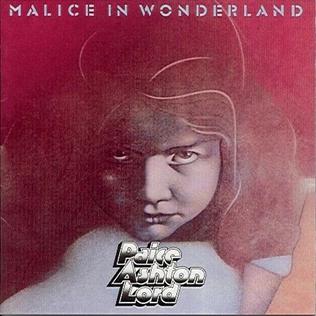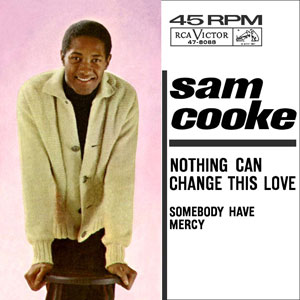
Samuel Cooke was an American singer and songwriter. Considered one of the most influential soul artists of all time, Cooke is commonly referred to as the "King of Soul" for his distinctive vocals, pioneering contributions to the genre, and significance in popular music. During his eight-year career, Cooke released 29 singles that charted in the Top 40 of the Billboard Pop Singles chart, as well as 20 singles in the Top Ten of Billboard's Black Singles chart. In 1964, he was shot and killed by the manager of a motel in Los Angeles. After an inquest and investigation, the courts ruled Cooke's death to be a justifiable homicide. His family has since questioned the circumstances of his death. Cooke is included on Billboard's 2015 list of the 35 greatest R&B artists of all time.
Avco Records was a record label started by music producers/composers Hugo Peretti and Luigi Creatore together with film and TV producer Joseph E. Levine in 1968 as Avco Embassy Records.

Gonna Take a Miracle is the fifth album by New York City-born singer, songwriter and pianist Laura Nyro, with assistance by vocal trio Labelle. It was released on Columbia Records in November 1971, one year after its predecessor Christmas and the Beads of Sweat. The album is Nyro's only all-covers album, and she interprets mainly 1950s and 1960s soul and R&B standards, using Labelle as a traditional back-up vocal group.

"A Change Is Gonna Come" is a song by American singer-songwriter Sam Cooke. It initially appeared on Cooke's album Ain't That Good News, released mid-February 1964 by RCA Victor; a slightly edited version of the recording was released as a single on December 22, 1964. Produced by Hugo & Luigi and arranged and conducted by René Hall, the song was the B-side to "Shake".
Hugo & Luigi were an American record producing team, the duo of songwriters and producers Hugo Peretti and Luigi Creatore. They shared an office in New York's Brill Building, and besides their working relationship, were cousins.
Hugo E. Peretti was an American songwriter, trumpeter, and record producer.

"You Send Me" is a song written and originally recorded by American singer Sam Cooke, released as a single in 1957 by Keen Records. Produced by Bumps Blackwell and arranged and conducted by René Hall. The song, Cooke's debut single, was a massive commercial success, becoming a No. 1 hit on both Billboard's Rhythm & Blues Records chart and the Billboard Hot 100.

"Bring It On Home to Me" is a song by American soul singer Sam Cooke, released on May 8, 1962, by RCA Victor. Produced by Hugo & Luigi, and arranged and conducted by René Hall, the song was the B-side to "Having a Party". The song peaked at number two on Billboard's Hot R&B Sides chart, and also charted at number 13 on the Billboard Hot 100. The song has become a pop standard, covered by numerous artists of different genres. It is one of The Rock and Roll Hall of Fame's 500 Songs that Shaped Rock and Roll.

We Remember Sam Cooke is the fifth studio album recorded by The Supremes, issued by Motown in April 1965. The album is a tribute album dedicated to soul musician Sam Cooke, who had died the previous December. Notable selections on the album, consisting entirely of Cooke covers, included covers of "A Change Is Gonna Come", "You Send Me" and "(Ain't That) Good News".

"Another Saturday Night" is a 1963 hit single by Sam Cooke from the album Ain't That Good News. The song was written by Cooke while touring in England when staying in a hotel where no female guests were allowed. It reached No. 10 on the Billboard Hot 100 and was No. 1 on the R&B chart for a single week. In the UK, the song peaked at No. 23 on the UK Singles Chart.

Portrait of a Legend: 1951–1964 is a compilation album by American singer-songwriter Sam Cooke, released posthumously on June 17, 2003, by ABKCO Records. The disc covers Cooke's entire career, from his early 1950s beginnings with the Soul Stirrers to the posthumous 1964 single "Shake". The collection includes most of the singer's hit singles, including "You Send Me", "Wonderful World", "Chain Gang", "Cupid", "Twistin' the Night Away", "Bring It On Home to Me", "Another Saturday Night", "Little Red Rooster", "Ain't That Good News", "Good Times", and what is often regarded as Cooke’s magnum opus, "A Change Is Gonna Come".
"Ain't That Good News", also known as "Good News", is a song written and performed by soul singer Sam Cooke, released on RCA Records in 1964. The song was recorded in three takes for the 1964 album of the same name and reached number eleven on the pop chart, and number one on the Cashbox Magazine's R&B charts as a single. Cooke performed the song live on American Bandstand on April 4 of the same year. It is a modern adaptation of an older gospel song of the same title.

Malice in Wonderland is the only studio album by Paice Ashton Lord. It was released in 1977.

Songs of the Ungrateful Living is the sixth solo studio album by the American recording artist Everlast. It was released on October 18, 2011, a follow-up to Love, War and the Ghost of Whitey Ford, by Martyr Inc Records in partnership with EMI. This was Everlast's second record released on his own label.

Doris Troy is an album released in 1970 on the Beatles' Apple Records label by American soul singer Doris Troy. It features songs written by Troy and a number of the participants on the sessions, including George Harrison, Stephen Stills, Klaus Voormann and Ringo Starr. Through the extended period of recording, the album became an all-star collaborative effort, typical of many Apple projects during 1968–70, although it was Troy's only album on the Beatles' label. Other guest musicians included Billy Preston, Peter Frampton, Leon Russell, Eric Clapton and members of the Delaney & Bonnie Friends band. Like the Harrison-produced single "Ain't That Cute", Doris Troy failed to chart in Britain or America on release.
"Sad Mood" is a song by American singer-songwriter Sam Cooke, released on November 8, 1960 by RCA Victor. Arranged and conducted by Sammy Lowe, the song charted within the top 30 of Billboard's Hot R&B Sides chart and the Billboard Hot 100.

"Having a Party" is a song by American singer-songwriter Sam Cooke, released on May 8, 1962, by RCA Victor. Produced by Hugo & Luigi and arranged and conducted by René Hall, the song was the A-side to "Bring It On Home to Me". The song peaked at number four on Billboard's Hot R&B Sides chart, and also charted at number 17 on the Billboard Hot 100.

"Nothing Can Change This Love" is a song by American singer-songwriter Sam Cooke. It was released as a single on September 11, 1962 by RCA Victor. The song peaked at No. 2 on Billboard's Hot R&B Singles chart, and also charted at No. 12 on the Hot 100. The song later got on the album Mr. Soul.
"Somebody Have Mercy" is a song by American singer-songwriter Sam Cooke, originally released in April 1962 on the album Twistin' the Night Away.
"That's It—I Quit—I'm Movin' On" is a song recorded by American singer Sam Cooke, released on February 14, 1961 by RCA Victor. Produced by Hugo & Luigi and arranged and conducted by Sammy Lowe, the song was a top 30 hit on Billboard's Hot R&B Sides chart and the Billboard Hot 100.














